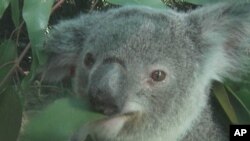The discovery of an AIDS-like virus in koalas is raising newfound fears the animal may soon face extinction. KIDS, or Koala Immune Deficiency Syndrome, decimates the koala's ability to fight off infection and disease.
Dr. Jon Hanger, the researcher who discovered the virus points out a very sick koala with the sexually transmitted disease Chlamydia, and now her doctors fear she may have developed the retrovirus that causes koala AIDS.
"These ulcers in the mouth are one of the hallmarks of this sort of AIDS condition," Hanger said. "From the patient stand point, it has similarities with human AIDS patients that undergo a prolonged and sad decline."
He says disease now poses as great a risk to these iconic marsupials as habitat loss from development, drought and fires. "Even within protected habitat, we're now understanding that those populations are now not secure, because disease is rife in them. And that they're not sustainable," he said.
The Australian government estimated in 2006 that koalas numbered in the hundreds of thousands, with some areas of the country experiencing over-population.
But that was before koala AIDS and a devastating drought, and last November, the government adopted a new National Koala Conservation Strategy in order to stabilize and manage the dwindling population.
Dr. Bob Beeton, who chairs the committee that is re-evaluating the koalas' status, says there are plans to publish a recommendation in September about whether koalas should now be listed as a threatened species. "We do know that there is disease in koalas at quite a high level in areas where the populations are stressed. What the general situation is, we're really still working on," he said.
On going work which is going too slowly for some. "The government really is not doing enough… I'm hoping that going into the future we see a lot more attention paid to understanding what this virus is doing and then a much more appropriate response," Hanger said.
The situation is so severe, that the koala population, according to advocacy groups, has been cut to just 43,000, down from 100,000 six years ago. And if that trend continues, koalas could go extinct in the next 30 years.
Nearly two years ago, Australia's largest animal hospital opened in Queensland. Director Gail Gipp says the koala is in peril. "I've seen since we've been in this hospital, even, local populations become extinct in that time. And it's happening, you know, really on a monthly basis in Queensland and the same in New South Wales," she said.
A report by the Australian Koala Foundation and the University of Queensland says losing the koala could potentially cost the Australian economy up to $1 billion annually in lost tourist revenue.
That could have a substantial affect on vacation destinations say both staff and holidaymakers at Sydney Wildlife World.
"They're such an iconic species, in Australia, and they're just so cute and cuddly, so yes they're definitely one of the main draw cards," said Kate Blount, Sydney Wildlife World koala keeper.
"Australia would lose something. It would really be a pity," remarned Stefan Kley, who is honeymooning in Australia.
Pia Spratley, a tourist, said "Koalas are an icon of Australia, and most people who want to come here they're going to want to see that icon."
Even though the U.S. government has classified the koala as endangered for over a decade, back at the Threatened Species Scientific Committee, Dr. Beeton says he doesn't believe the beloved species will become extinct. "That assumes you're adopting a do-nothing option. And quite clearly there's a lot of consideration being given to what interventions might take place and how they might happen," he said.
Interventions likely will come far too late for this mother koala. But veterinarians here hope they will allow her joeys, and her species, to again flourish rather than fade.
Koala AIDS Poses Increased Hazard to Australian Icon Already at Risk
- By Derek Henkle




